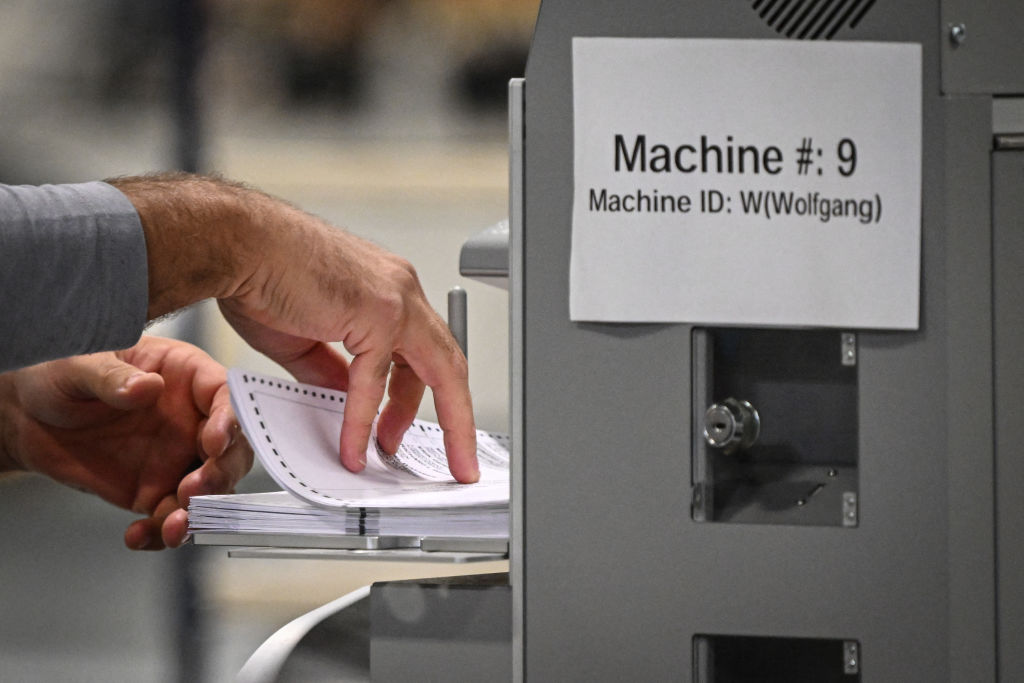The states where midterms recounts are most likely


A free daily email with the biggest news stories of the day – and the best features from TheWeek.com
You are now subscribed
Your newsletter sign-up was successful
If the 2022 election is anything like 2020, voters shouldn't expect to see the result of every race right away. For one thing, states like Wisconsin, Michigan, or Arizona might find themselves delayed by requests for a recount, whether automatic or candidate-petitioned, CNBC reports.
In Arizona, for example (where some especially bitter and tight contests are underway), a recount is automatically triggered "if the margin between a candidate and the winner is less than or equal to 0.5 percent [of] the total votes," CNBC writes. The same goes for the battleground states of Florida and Pennsylvania, though there is no margin requirement for a recount request in Pennsylvania, and only the secretary of state can call for a recount in Florida. A quarter-point margin triggers a recount in Ohio for statewide races.
In Wisconsin, where Republican Sen. Ron Johnson hasn't committed to accepting the election's results (he hasn't said he'll challenge them, either), voters could find themselves caught up in a candidate-requested recount, but only if the margin "is less than or equal to 1 percent of the total votes cast," CNBC notes. Michigan gubernatorial candidate Tudor Dixon (R) has similarly dodged questions of election acceptance; there is no margin requirement for a recount request in her state, but one is automatically triggered by a margin of 2,000 votes or less.
The Week
Escape your echo chamber. Get the facts behind the news, plus analysis from multiple perspectives.

Sign up for The Week's Free Newsletters
From our morning news briefing to a weekly Good News Newsletter, get the best of The Week delivered directly to your inbox.
From our morning news briefing to a weekly Good News Newsletter, get the best of The Week delivered directly to your inbox.
Down south, Democratic candidate for Texas governor Beto O'Rourke has said he's "not counting on" Gov. Greg Abbott (R) to concede in the event of a loss; but a recount is only automatic should the pair tie. Otherwise, the losing candidate can request one so long as their loss is "less than 10 percent of the total number of votes received by the winner," per CNBC. And in Georgia, the site of plenty of election drama in 2020, a candidate can only request a recount if the margin is less than or equal to 0.5 percent of total votes cast.
Ultimately, remember that "recounts rarely change the outcome of elections," writes Talking Points Memo — rather, they just "add days onto the process as officials re-tally the results."
A free daily email with the biggest news stories of the day – and the best features from TheWeek.com
Brigid Kennedy worked at The Week from 2021 to 2023 as a staff writer, junior editor and then story editor, with an interest in U.S. politics, the economy and the music industry.
-
 Secured vs. unsecured loans: how do they differ and which is better?
Secured vs. unsecured loans: how do they differ and which is better?the explainer They are distinguished by the level of risk and the inclusion of collateral
-
 ‘States that set ambitious climate targets are already feeling the tension’
‘States that set ambitious climate targets are already feeling the tension’Instant Opinion Opinion, comment and editorials of the day
-
 Mixing up mixology: The year ahead in cocktail and bar trends
Mixing up mixology: The year ahead in cocktail and bar trendsthe week recommends It’s hojicha vs. matcha, plus a whole lot more
-
 Labor secretary’s husband barred amid assault probe
Labor secretary’s husband barred amid assault probeSpeed Read Shawn DeRemer, the husband of Labor Secretary Lori Chavez-DeRemer, has been accused of sexual assault
-
 Trump touts pledges at 1st Board of Peace meeting
Trump touts pledges at 1st Board of Peace meetingSpeed Read At the inaugural meeting, the president announced nine countries have agreed to pledge a combined $7 billion for a Gaza relief package
-
 NIH director Bhattacharya tapped as acting CDC head
NIH director Bhattacharya tapped as acting CDC headSpeed Read Jay Bhattacharya, a critic of the CDC’s Covid-19 response, will now lead the Centers for Disease Control and Prevention
-
 Witkoff and Kushner tackle Ukraine, Iran in Geneva
Witkoff and Kushner tackle Ukraine, Iran in GenevaSpeed Read Steve Witkoff and Jared Kushner held negotiations aimed at securing a nuclear deal with Iran and an end to Russia’s war in Ukraine
-
 Pentagon spokesperson forced out as DHS’s resigns
Pentagon spokesperson forced out as DHS’s resignsSpeed Read Senior military adviser Col. David Butler was fired by Pete Hegseth and Homeland Security spokesperson Tricia McLaughlin is resigning
-
 Judge orders Washington slavery exhibit restored
Judge orders Washington slavery exhibit restoredSpeed Read The Trump administration took down displays about slavery at the President’s House Site in Philadelphia
-
 Hyatt chair joins growing list of Epstein files losers
Hyatt chair joins growing list of Epstein files losersSpeed Read Thomas Pritzker stepped down as executive chair of the Hyatt Hotels Corporation over his ties with Jeffrey Epstein and Ghislaine Maxwell
-
 Judge blocks Hegseth from punishing Kelly over video
Judge blocks Hegseth from punishing Kelly over videoSpeed Read Defense Secretary Pete Hegseth pushed for the senator to be demoted over a video in which he reminds military officials they should refuse illegal orders
